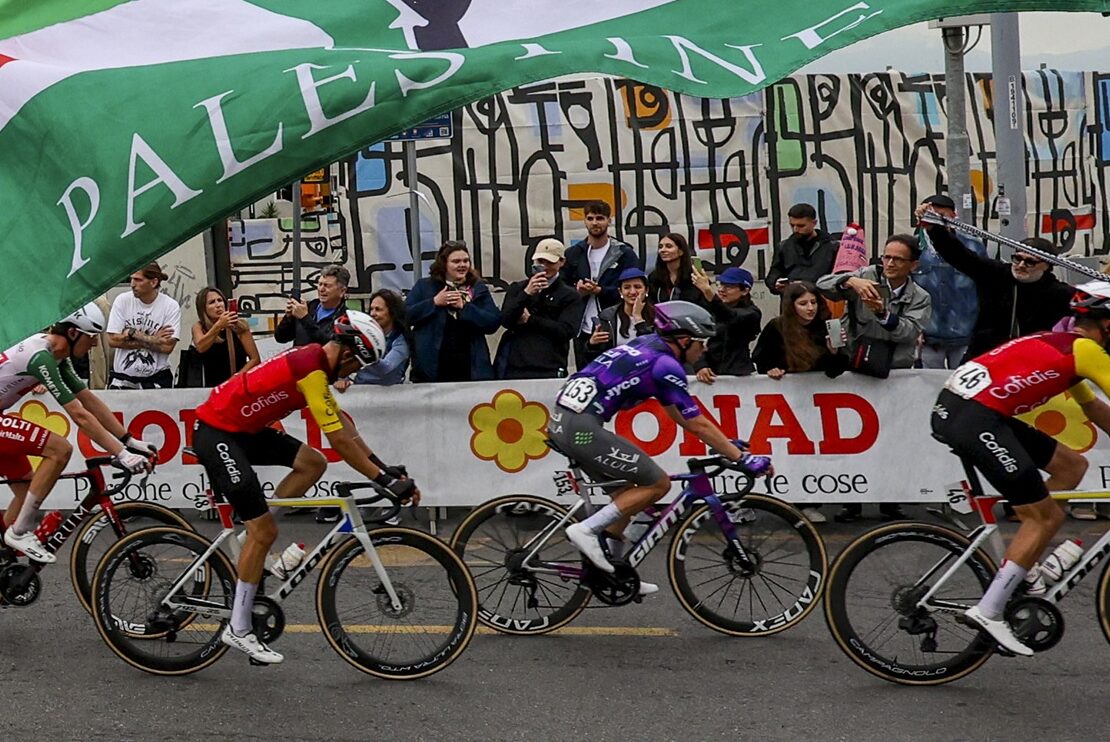Calls To Cancel Israel Collide With Sport’s Core Ethos
From blocked tickets in Birmingham to a pro-Israel cycling team’s exclusion in Italy, mounting cases fuel arguments that politics and double standards are overtaking the playing field
Sports-crazed Australians are known for their obsession with Australian rules football—it’s a second religion for its adherents. In a bid to promote the sport internationally, a tournament is held every few years in Australia, drawing enthusiasts from around the world.
Remarkably, instead of Israel fielding a standard national side, a team was formed under the auspices of the Shimon Peres Peace Center, comprising expat Australians, Israelis, and Palestinians, including some from Gaza and the West Bank. The team competed in 2008 and 2011, generating wide publicity and showcasing how sport can—and should—unite traditional enemies and promote goodwill.
Major global sporting events—from the Olympic Games to the FIFA World Cup—have long welcomed countries regardless of regime type. Even some of the world’s worst regimes, such as North Korea and Iran, have rarely had their credentials challenged.
Yet sporting boycotts have sometimes been used to punish or pressure what many label rogue regimes. South Africa, for example, was ostracized in the 1970s over its apartheid policies.
The 1980 Olympic Games in Moscow saw a broad boycott by nations protesting the Soviet Union’s invasion of Afghanistan. Today, Russia is banned from many competitions due to global opposition to its invasion of Ukraine.
Israel’s place in international sport has been fraught since its establishment. Because of opposition from the Muslim world, it could not remain in the Asian confederation and was eventually accepted into European competitions.
Against that backdrop, the global campaign to delegitimize Israel—amplified by bodies such as the United Nations—has drifted into treating Israel as a pariah. Accusations by the UN and some NGOs over Israel’s conduct in the war in Gaza, including charges of genocide and war crimes, have helped unleash open antisemitism, visible now in calls to ban Israeli participation in sports and cultural arenas.
Give the gift of hope
We practice what we preach:
accurate, fearless journalism. But we can't do it alone.
- On the ground in Gaza, Syria, Israel, Egypt, Pakistan, and more
- Our program trained more than 100 journalists
- Calling out fake news and reporting real facts
- On the ground in Gaza, Syria, Israel, Egypt, Pakistan, and more
- Our program trained more than 100 journalists
- Calling out fake news and reporting real facts
Join us.
Support The Media Line. Save democracy.


The last two months have produced concrete examples. Fans of Maccabi Tel Aviv were told they could not attend a football match in Birmingham after intense lobbying from Muslim politicians, who issued threats that led West Midlands Police to say they could not ensure fans’ safety.
Another prominent case concerns the Israel–Premier Tech cycling team, funded by pro-Israel Canadian entrepreneur Sylvan Adams. Mass protests at an event in Spain were followed by the team’s exclusion from a major event in Italy.
One cannot help but be despondent at the hypocrisy and moral inversion on display. Israel is a democracy engaged in an existential conflict it did not initiate; the parallels to Russia do not apply. Cacophonous street protests in the West, combined with cultural-elite campaigns to cancel Israel, have paved the way for Western governments to pile on pressure.
Sports governing bodies, to date, appear ready to cower to these calls. Governments, with few exceptions, have either endorsed them or remained silent—especially in Europe, where mass immigration and heated politics have unlocked open hatred targeting Jews and Israelis.
To date, Israel’s response has been muted, with reports indicating a soft, behind-the-scenes effort aimed at preventing bodies such as FIFA from holding a vote to ban Israel. Indications are that the current cease-fire proposal may prompt a deferment—or even an end—to FIFA-related moves. Maccabi Tel Aviv also abandoned ticket sales to its fans for the Birmingham match under the pretense that far-right advocacy on their behalf would endanger them, a decision that allowed the UK government to avoid intervening and that many say shows police caving to mob rule by Muslim extremists.
Yet calls to ostracize Israel across sports and culture require a far more substantial, public campaign by Israel and Jewish communities worldwide to expose double standards and hypocrisy. It needs to call out antisemitism plainly. The movement to ban and cancel Israel is gaining momentum. Prime Minister Benjamin Netanyahu’s recent comment likening Israel to a modern-day Sparta was not directed at the sports-ban push, but the analogy fits.
Yom Kippur brought a grim reminder of what demonization can yield when a terrorist attacked a synagogue. Following the recognition of Palestinian statehood by several Western countries, the pro-Palestine movement is escalating demands for sanctions.
It is time for Israel to launch a major global campaign showing that calls to ban Israel reek of antisemitism and double standards, holding Israel to norms applied to no one else. It must vigorously contest allegations of genocide and war crimes.
If the world insists on using sports and cultural platforms for political purposes, consistency must apply. That Iran—the promoter and chief instigator of turmoil across the Middle East, a driver of the current war in Gaza, and a serial human-rights abuser—gets a free pass epitomizes today’s moral vacuum.
UK Prime Minister Keir Starmer recently penned an article bemoaning antisemitism’s rise in Britain. Here’s a concrete challenge to Israel and the Jewish community: call on Starmer to follow Germany’s lead and withdraw from Eurovision if Israel is excluded, and to instruct FIFA and UEFA that the UK will not tolerate any attempt to bar Israel or Israeli clubs from European competitions or the World Cup. He should also make clear to police that there can be no surrender to mob threats and that Jews and Israelis deserve the freedom and protection to attend sporting events.
Ultimately, sports must return to their true ethos: breaking down barriers and promoting harmony. The Shimon Peres Peace Center’s example shows exactly how that can be done.


